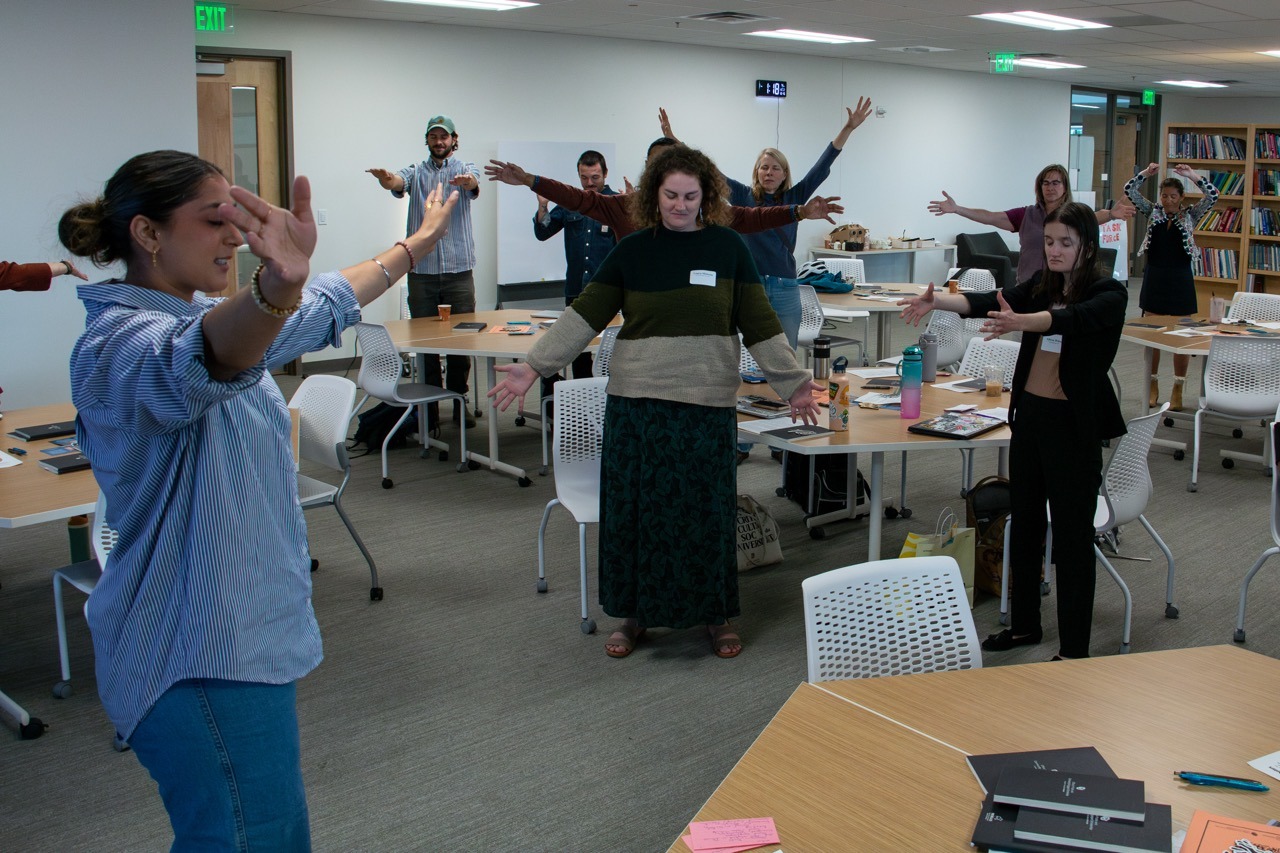
Harveen Gill leads a group meditation during a presentation on her work as an Engaged Arts and Humanities Scholar at Research and Innovation Week.
Since its launch in 2018, the Engaged Arts and Humanities (EAH) Graduate Student Scholars Program at CU has given 40 students the opportunity and resources to combine their academic disciplines, the tools of the arts and humanities, and their unique individual interests and apply them to public and community-engaged scholarship projects.
“I believe the program’s focus on lived experience, equity-oriented partnerships and mutually beneficial community-engaged scholarship has been key in creating an inclusive community of learners,” said Lisa Schwartz, Office for Public and Community-Engaged Scholarship Program Manager and EAH founder.
The two-year fellowship, now co-administered by the Office for Public and Community-Engaged Scholarship (PACES) and the Center for the Humanities & the Arts (CHA), encourages students to work collaboratively with communities to create meaningful, lasting change and allows students to broaden their networks on and off campus. Students co-design mutually beneficial projects with community partners, receiving a $5,000 stipend over two years and up to $1,000 in project funding.
Professor Jennifer Ho, CHA’s faculty director, works with the CHA team and Schwartz to oversee and implement the program. “I’m thrilled that the CHA is partnering with PACES on this program. When Lisa Schwartz first told me about the program, I could see the vitality and mutual intellectual and creative aims of having graduate students use their expertise in service to community-engaged projects. Lisa’s leadership of the program is part of the secret sauce to its success, as is the passion of the EAH scholars for work outside the traditional walls of academia.”
EAH Fellow Amy Hoagland’s 2021-22 project with CU Science Discovery and Cal-Wood Education Center serves as a prime example of the program’s impact on the surrounding community and her future as an artist and advocate for environmental justice. Combining her passions for art and science, Hoagland initiated a series of outdoor events with youth and families, providing opportunities for the “mourning, celebration and collective recognition of the impact of climate change.”
Hoagland creates artwork to “provoke thought and change in people’s relationship with the surrounding landscape.” While continuing her work inspired by EAH Scholars, Hoagland received a 2022 Windgate Fellowship for sustainable art presented by Honoring the Future.
“I cannot express my gratitude for EAH Scholars and Lisa Schwartz’s mentorship. It has all been incredibly impactful on my practice. It will positively impact my future projects, too,” said Hoagland.
A key aspect of EAH Scholars is the experience of selecting, interviewing and developing a relationship with a mentor who is a community-engaged scholar within the university or broader community (Read the EAH scholar mentor interviews here). PhD student Idowu Odeyemi shared his experience working with Professor Briana Toole, founder and director of the Corrupt the Youth program.
“Professor Toole’s community greatly intersects with mine; it was very easy to form a connection with her. She was helpful in terms of how I can develop my ideas for the sort of community work that I want my project to be about,” said Idowu.
A number of scholars have incorporated their work with EAH into their MFA thesis and PhD research. Brenda Aguirre Ortega is one such student. Through sharing and developing her ideas with members of the EAH cohort, as well as securing additional funding, Aguirre-Ortega’s multitude of interests evolved into her establishing and co-facilitating an after-school program at Columbine Elementary School, combining her passions of teaching, music composition and mathematics. In an interview discussing her experience with community-engaged scholarship, Aguirre-Ortega emphasized the program’s impact on her.
“At first, I only knew that I wanted to create a project in a school and that it would have something to do with music production,” said Aguirre-Ortega. “The idea became more tangible when I started sharing it with the EAH cohort. We were all beginning projects, and we helped each other develop ideas.”
EAH Scholars is now welcoming new graduate students for the 2025-2027 cohort. Visit the program’s webpage to learn more about deadlines, eligibility and the application process.